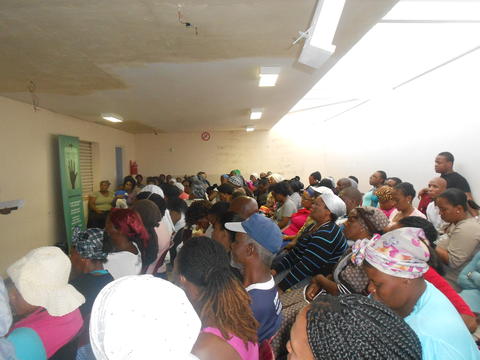
The Makhaza Open day was held on Saturday the 8th of February. A very special day for IkamvaYouth Makhaza as new learners and new parents meet. It was also great opportunity for the new Ikamvanites and their parents to meet and be inspired by our Tutors and returning learners. The day was divided into two sessions the first was for the parents only followed by the session for learners.
The first session was filled with eager parents. Zukile Keswa (Branch Coordinator) hosted the gathering, welcoming everyone and playing the IkamvaYouth video explainer. All the programmes that are offered at Makhaza were explained to parents and they were informed about the role that they have to play to insure the success of the programme. Zukile further explained the importance of being involved in the academics of a child even if a parent is illiterate and how that encourages a child to do more as they have a great support system at home. The reception from the parents was overwhelming as they shared how happy they that their kids’ are part of IY. One parent said “I can sleep better a night knowing that my child is getting the most valuable education in life even after I’m no longer in this world”. All in good time we shared.

The second session was just refreshing as you could feel the excitement of the new learners in the hall. The learners were welcomed and few questions were asked: Why did you apply to IY? Why are you here today? The learners responded with such confidence that convinced all of us that 2014 would indeed be a year of greatness. The tutors introduced themselves to the learners, sharing where they had attended High School which seemed to excite the learners, what they were currently doing and subjects they tutor.
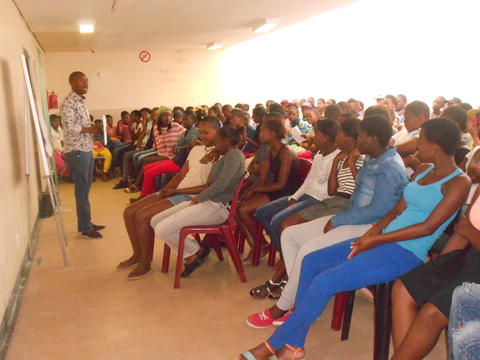
The day was a success, so looking forward to the 15th of February when tutoring starts.
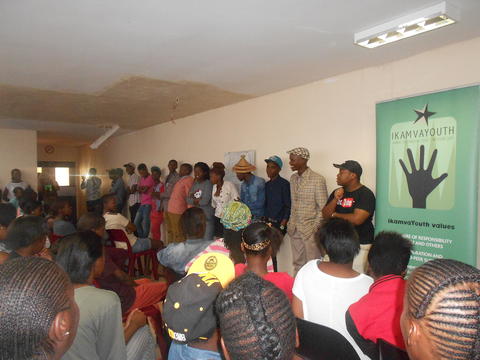
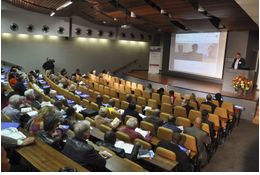
The Education Management Association of South Africa (EMASA) conference and its subsequent projects have embodied exactly what it was attempting to ignite; true collaboration. The event was conceived and brought to fruition by a wide range of partners; Bridge, The Bertha Centre for Social Innovation and Entrepreneurship, UFS, Saville Foundation, and the Centre for Education Innovation (CEI) and many more, who shared the objective of bringing together and showcasing transformative projects and their champions who are driving educational innovation.

IkamvaYouth presented on ‘What Works’ at the conference. Presentation.
IkamvaYouth were just one of many organisations that were recognised and included in CEI’s ever-growing international database of innovative projects in education. CEI does not simply describe such interventions, but they seek to better explain their impact, why they work, and how they could be replicated.
The gathering and communicating of evidence of what is working (or not), why it is working (or not) and how it can work in other contexts, is essential for workable replication and scale. Currently too few educational innovations are able to provide evidence of their impact, and where evidence does exist it is not being widely publicised and learnt from. CEI has tasked itself with, among other things, ‘improving the information flows and promoting linkages among stakeholders’.
Fostering stakeholder relationships and partnerships was reflected in the conference theme ‘From Cradle to Career’, which is the idea to connect organisations in a continuous stream of intervention, all the way through childhood and into adulthood. The importance of partnerships is becoming ever more prevalent, with heightened attention around ’collaboration’ as a vehicle for high-impact and sustainable growth.
Collaboration is a concept that is being applied in various different sectors across the world as a powerful tool to increase productivity, efficiency, and longevity. Yet, as much as collaboration is being hailed as the next step to achieving lasting impact, tried and tested ways of successfully doing it in the non-profit sector, are few.
“We urgently need to find new structures that enable effective collaboration. The old ways have failed us. Taking steps towards real collaboration involves building social capital and trust, understanding the obstacles to collaboration (fear, insecurity, lack of effective structures and so on) and lowering these barriers so that people are freed to work together unconditionally towards a common goal.” François Bonnici, Director of the Bertha Centre for Social Innovation and Entrepreneurship.

Joy Oliver, Eugene Daniels and David Harrison
There is no blueprint of how we can best work together and it will always be subject to change. What we can develop are the structures and mechanisms that facilitate it. EMASA showcased the incredible amount of ‘will’ that exists to make collaboration possible within and across sectors. We need to be committed to trying, testing and recording how we are working together. To collaborate effectively you need take risks, to “recognize, accept and even celebrate failure”, David Harrison of the DG Murray Trust.
Just as we encourage our learners to guess and to be comfortable with their likely failure, we must encourage ourselves to look to partners, to foster relationships (even with our adversaries), to find new ways to learn from each other, and to embrace the possibility of disappointment, “because without the failure that comes with experimentation there could be no learning or progress”, David Harrison.
Check out the emasa_booklet_1.pdf here for details of all the partners and inspiring organisations present.
The mentorship programme has been a great success since its formal inception 2 years ago at the Ebony Park Branch. There have been many success stories with many of the mentorship relationships going beyond the agreed time frames becoming real life long relationships.
Saturday the 8th of February was the start of our mentorship programme for 2014. About 40 Grade 12s waited eagerly to get introduced to their new mentors. The branch was overwhelmed with the positive response from professionals around Gauteng who were also eager to get started. The programme started at 10am, with Lewis Mash, the Alumni Coordinator taking the mentors through what mentorship at IkamvaYouth means and how long a commitment it should be. This was followed by a question and answer session where all the mentors could get clarification on concerns or questions they had.
One mentor, Lindani Lufu, who holds a Masters in Civil Engineering could not hold her excitement after beeing paired with a young Grade 12 learner who is an aspiring civil engineer.” All roads lead to success,” she said, with a big smile on her face.
We are excited to start the year with a BANG and the call for mentors still continues as we would love for all our Grade 11 Ikamvanites to have mentors walking with them too. Starting the relationships out early in the year will give the mentors enough time to work and encourage their mentees success.
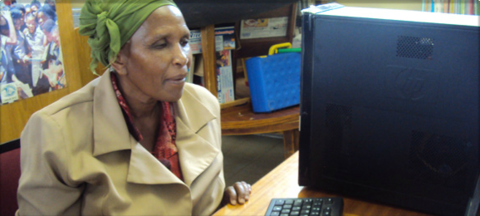
In November 2013 IkamvaYouth was fortunate to be invited to present on the theme of collaboration at the first Botswana Library Innovation Summit. It gathered a wonderful group of innovators from libraries all across Botswana.
Each library presented their innovative project, which ranged from the preservation of history and culture, to mobile buses equipped with internet, to providing services for the visually impaired. The projects are inspiring and the people that are dreaming them up and making them happen are even more impressive. Like many grassroots organisations and projects, they are driven by unbelievable individuals and their passion alone.
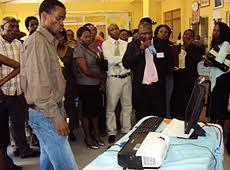
Muan and Kasane Public Libraries showcasing their projects
What the Botswana Department of Library Services are doing exceptionally well is recognising and supporting these passionate individuals that know best what is needed in their communities. This model of support produces highly relevant and workable projects. The question of “What is needed here?” is asked by the stakeholders, rather than outsiders making assumptions as to what is best.
This speaks to IkamvaYouth’s own vision for collaboration, which is to form mutually beneficial partnerships with passionate organisations and individuals who want to work towards a collective impact. To truly support this vision the relationships between the partners need be honest and open and above all must be supportive.
Sesigo is one such partnership, formed between the government of Botswana National Library Service, and the Bill and Melinda Gates Foundation to provide free internet services to all 78 public libraries across the country. So far they have extended services to 24 libraries and the impact has been incredible; reflected by the broad range of internet aided projects. The key to its success is that the Botswana government is hugely supportive of the initiative and is open to sharing local knowledge and facilitating conversations. In turn the Gates Foundation is providing training and mentorship to strengthen the local technological capacity and increase the sustainability of the project.

An internet facility enabled by Sesigo in northern Botswana
This idea of mentorship came out time and time again over the 3 days. In the inaugural speech Stella Monageng, former Head of Libraries at the Institute of Development Management, spoke about the importance of mentorship for innovation. That there are two roles needed for innovation to flourish; the learner and the teacher. What was emphasised is that for real innovation to occur we must all be comfortable to play each of these roles and to move between them. We all need to teach and provide information to assist others, but we also need to makes sure that we listen and learn from others, regardless of where we lie in the hierarchical structures of societies and organisations.
I really respect these comments and it set the tone for the week. Ms Monageng encouraged extremely shy presenters to get up on the podium and know they were being listened to by their peers, by representatives from other countries, and by governmental officials. It also opened eyes and ears to new opportunities. The idea of libraries running tutoring programmes was very much seeded. IkamvaYouth Botswana….maybe one day!?
I came away from the week feeling rejuvenated and excited to start IkamvaYouth’s collaboration project with similarly amazing organisations and individuals, while holding the idea of mentorship as central to the process. The rollercoaster ride on the final day of the summit may have also contributed to this excitement!
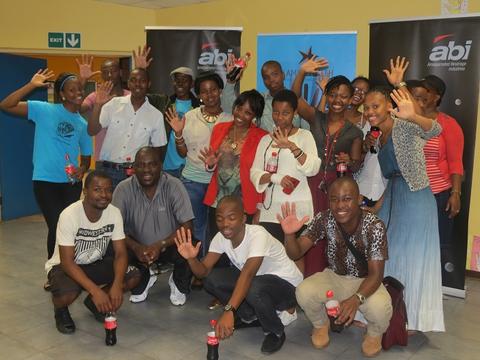
Saturday the 25th of January 2014 saw the Umlazi branch host their annual Open day at the Umlazi AA library. The event started with a wonderful song from one of the learners at the branch. S’bonelo (Branch Coordinators) and N’thabiseng (Branch Assistant) proceeded to welcome the people and presented a PowerPoint based presentation. The presentation gave an overview of IkamvaYouth, the work IkamvaYouth does and the geographical reach of the organisation.

Staff and volunteers Open Day 2014
It also featured highlights of activities in the Umlazi branch from 2013. The presentation included the matric pass rate and the requirements for learners who join IkamvaYouth to keep their place in the programmes offered. The matric class of 2013 was celebrated with a visual tribute compiled by N’thabiseng.
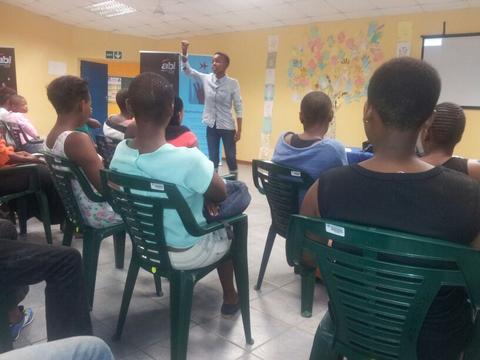
IkamvaYouth Learner Zekhethelo Ngcobo reciting her touching poem
The video was followed by a performance from one of the learners who recited a poem about IkamvaYouth and the impact it has on learners. A testimonial from an ex-matric learner gave prospective learners a insight into the kind of impact being an Ikamvanite can have on one’s life. This was followed by a brief talk from a current volunteer tutor who spoke of his experience and what he feels is needed to be a successful Ikamvanite.
Ms Phumelele Kunene, from MUT gave a brief talk on the relationship IkamvaYouth Umlazi has with Mangosuthu University of Technology. She also motivated the learners in terms of their future choices in life.
We were blessed by the presence of ABI Soul Ambassadors (pictured below) who were accompanied by Samukelo Nkosi the Corporate Social Investment Coordinator-KZN for ABI.
Before everyone was served refreshments, courtesy of ABI, a surprise performance by Msizi (a local poet) brought the day to a close on a very high note.
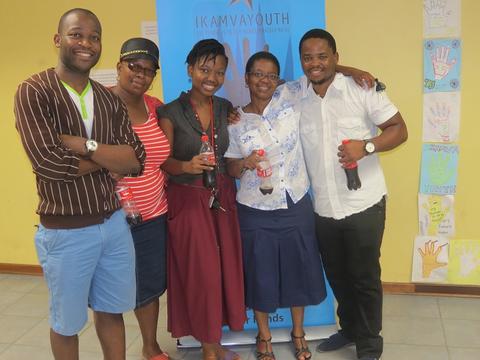
The Soul Ambassadors (Wonder Mzobe,Patience Simela, and Nokwethemba Mpisi) with Thabisile Seme and S’bonelo Cele














 Lloyd Lungu
Lloyd Lungu